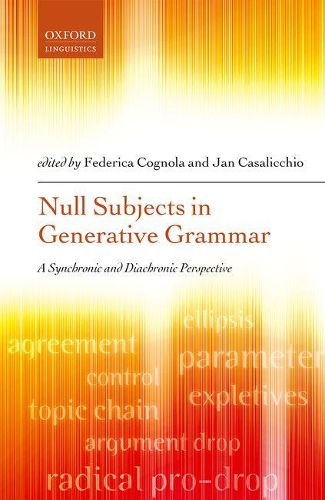Readings Newsletter
Become a Readings Member to make your shopping experience even easier.
Sign in or sign up for free!
You’re not far away from qualifying for FREE standard shipping within Australia
You’ve qualified for FREE standard shipping within Australia
The cart is loading…






This book considers the null-subject phenomenon, whereby some languages lack an overtly realized referential subject in specific contexts. In generative syntax-the approach adopted in this volume-the phenomenon has traditionally been explained in terms of a ‘pro-drop’ parameter with associated cluster properties; more recently, however, it has become clear that pro-drop phenomena do not always correlate with all the initially predicted cluster properties.This volume returns to the centre of the debate surrounding the empirical phenomena associated with null subjects. Experts in the field explore the cluster properties associated with pro-drop; the types of null category involved in null-subject phenomena and their identification; and the typology of null-subject languages, with a special focus on partial null-subject languages. Chapters include both novel empirical data and new theoretical analyses covering the major approaches to null subjects in generative grammar. A wide range of languages are examined, ranging from the most commonly studied in research into null subjects, such as Finnish and Italian, to lesser-studied languages such as Vietnamese and Polish, minority languages such as Cimbrian and Kashubian, and historical varieties such as Old French and Old High German. The research presented also contributes to the understanding of other key syntactic phenomena, such as the nature of control, the role of information structure and semantics in syntax, the mechanisms of language change, and the formalization of language variation.The breadth and depth of the volume will make it a valuable resource not only for generative syntacticians, but also for all those working in the fields of historical linguistics, typology, comparative grammar, semantics, and theoretical and descriptive linguistics more generally.
$9.00 standard shipping within Australia
FREE standard shipping within Australia for orders over $100.00
Express & International shipping calculated at checkout
This book considers the null-subject phenomenon, whereby some languages lack an overtly realized referential subject in specific contexts. In generative syntax-the approach adopted in this volume-the phenomenon has traditionally been explained in terms of a ‘pro-drop’ parameter with associated cluster properties; more recently, however, it has become clear that pro-drop phenomena do not always correlate with all the initially predicted cluster properties.This volume returns to the centre of the debate surrounding the empirical phenomena associated with null subjects. Experts in the field explore the cluster properties associated with pro-drop; the types of null category involved in null-subject phenomena and their identification; and the typology of null-subject languages, with a special focus on partial null-subject languages. Chapters include both novel empirical data and new theoretical analyses covering the major approaches to null subjects in generative grammar. A wide range of languages are examined, ranging from the most commonly studied in research into null subjects, such as Finnish and Italian, to lesser-studied languages such as Vietnamese and Polish, minority languages such as Cimbrian and Kashubian, and historical varieties such as Old French and Old High German. The research presented also contributes to the understanding of other key syntactic phenomena, such as the nature of control, the role of information structure and semantics in syntax, the mechanisms of language change, and the formalization of language variation.The breadth and depth of the volume will make it a valuable resource not only for generative syntacticians, but also for all those working in the fields of historical linguistics, typology, comparative grammar, semantics, and theoretical and descriptive linguistics more generally.